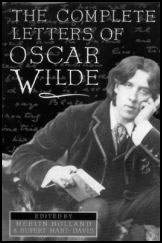THE COMPLETE LETTERS OF OSCAR WILDE
(Henry Holt, $45)
IT’S COMMONPLACE to observe, in any review of any collection of letters, “These letters by X are the closest thing to an autobiography we’ll ever have.” It’s a particular loss that Oscar Wilde never wrote his memoirs; the genius of this “lord of language” (his own self-description) resided even more in his conversation, his contemporaries claimed, than in his poetry, prose, or drama.
But we do have Wilde’s letters, in all their flamboyant, infuriating glory, republished late last year to mark the centennial of his death (November 30, 2000). The first edition appeared in 1962, edited and footnoted with dazzling meticulousness and erudition by Rupert Hart-Davis—a landmark in the history of the genre. Davis published a supplement of a further 164 letters in 1985; the current volume, co-edited by Hart-Davis (who died in 1999) and by Wilde’s grandson Merlin Holland, adds another 300, for a total of nearly 1,600 letters. Brief notes, social invitations, and such—omitted by Hart-Davis in 1962—have been restored here and the volume claims to include literally every known extant letter by Wilde.
How many further hundreds, though, must have been lost over the decades—or deliberately destroyed? For Wilde suffered one of the most spectacular falls from grace in literary history. It was in 1895, precisely and ironically at the peak of his fame, with An Ideal Husband and The Importance of Being Earnest both playing to full and brilliant houses, that Wilde launched a libel suit against the sociopathic Marquess of Queensberry. The marquess had been hounding Wilde for years and had left an insulting and illiterate card for Wilde at his club: “To Oscar Wilde, posing as somdomite.”
The libel suit was an astonishing, nearly suicidal, action—because Wilde was gay and had indulged his tastes to the fullest. It was the scandal of the century: A parade of rent-boys gave humiliating evidence and Wilde himself was cross-examined on such “decadent” writings of his as The Picture of Dorian Gray, taken as proof of “unwholesome” tendencies. Queensberry was found not guilty and the inevitable next step was Wilde’s arrest, conviction, and sentence of two years of hard labor for sodomy.
THE MOST POIGNANT evidence of the opprobrium Wilde suffered is that of all the letters in this volume, only three— one brief love letter from early in their courtship and two briefer notes—survive from Wilde to his wife Constance. (Her name was heroically apt; their marriage, affectionate.) The rest were destroyed either by her or by her family after her death. (Oscar and Constance, by the way, had two sons, Cyril and Vyvyan, the latter of whom is Merlin Holland’s father.)
Also notable, and telling, is the relative scarcity of letters from Wilde to the co-star of the tragedy: Lord Alfred Douglas, Wilde’s lover and Queensberry’s son. Douglas was, not to put too fine a point on it, a loathsome little prick. Beautiful, perhaps (if you like that type), but thoroughly spoiled. His relationship with Wilde was one of financial exploitation and moments of astounding cruelty, relieved by idylls of mutual adoration. Douglas’ hatred of his father drove him to badger Wilde into the libel suit, and much of his life after Wilde’s death was spent in contemptible denial of all Wilde had done for him and sacrificed to him.
Wilde revenged himself on Douglas with his pen, composing in prison De Profundis, the long, accusatory letter that forms the centerpiece of this collection. This letter opens the most fascinating and moving section of the book, which recounts Wilde’s release and the three and a half years of exile he spent in France. As his sentence drew to a close and his friends outside were arranging his business affairs, Wilde thanked them with a series of willful, exasperated, exasperating, abusive—and, it must be said, occasionally hilarious—letters. “He is incapable,” wrote Wilde of his friend More Adey, “of managing the domestic affairs of a tom-tit in a hedge for a single afternoon.”
Then, on May 18, 1897, Wilde left prison and his life began anew. More than a hundred letters survive from his outpouring of correspondence that summer alone, as he lodged in the village of Berneval and began to plan to resume writing. Wilde was in the highest of spirits; these letters seem to be suffused with sparkling Atlantic sunlight and sea breezes. At the end of the summer, however, Wilde re-ruins his life by going back to Douglas, asserting that he can’t live alone (understandable) and that Douglas will stimulate his creativity (Wilde is kidding himself; in De Profundis, he’d outlined in bitter detail just how unproductive his time with Douglas was).
The results will be utterly predictable to any reader, just as they were to Wilde’s friends at the time: Constance, fed up, stops his allowance and Douglas’ companionship lasts no longer than Wilde’s money does. Wilde wanders back to Paris and never writes another line except for these letters, still charming when he’s not wheedling his friends for money—which he does almost constantly. Wilde’s last words in the last entry in this magnificent collection, written a week before his death: “I rely on receiving the 150 you owe me.”







